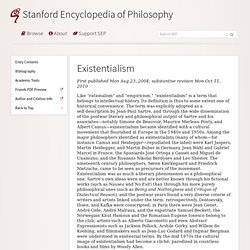

Concepts. Existentialism. First published Mon Aug 23, 2004; substantive revision Mon Oct 11, 2010 Like “rationalism” and “empiricism,” “existentialism” is a term that belongs to intellectual history.

Its definition is thus to some extent one of historical convenience. The term was explicitly adopted as a self-description by Jean-Paul Sartre, and through the wide dissemination of the postwar literary and philosophical output of Sartre and his associates—notably Simone de Beauvoir, Maurice Merleau-Ponty, and Albert Camus—existentialism became identified with a cultural movement that flourished in Europe in the 1940s and 1950s. Among the major philosophers identified as existentialists (many of whom—for instance Camus and Heidegger—repudiated the label) were Karl Jaspers, Martin Heidegger, and Martin Buber in Germany, Jean Wahl and Gabriel Marcel in France, the Spaniards José Ortega y Gasset and Miguel de Unamuno, and the Russians Nikolai Berdyaev and Lev Shestov.
Useful Sources/Information. Stanford Encyclopedia of Philosophy.